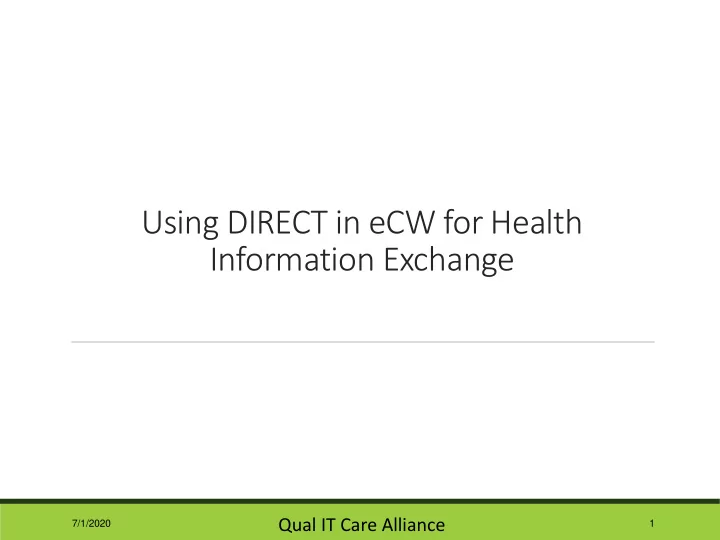

Using DIRECT in eCW for Health Information Exchange Qual IT Care Alliance 7/1/2020 1
What is DIRECT? ➢ Direct is a technical standard for exchanging health information between health care entities (e.g, primary care providers, specialists, hospitals, clinical labs) in a trusted network. It is a secure, easy-to-use, inexpensive and approved for use by nationally-recognized experts and organizations. Direct functions like regular email with additional security measures to ensure that messages are only accessible to the intended recipient, per the protection regulations of the Health Insurance Portability and Accountability Act (HIPAA). ➢ Only a DIRECT address can send or receive a message from another DIRECT address. Messages sent from a regular email address (Outlook, Gmail, yahoo, etc.) to a DIRECT address will FAIL. ➢ A Health Information Services Provider (HISP) is an organization that manages security and transport for health information exchange among healthcare entities and individuals using the DIRECT standard for transport. Qual IT Care Alliance 7/1/2020 2
How do I get a DIRECT Address? ➢ There are multiple entities from which a DIRECT address can be requested (e.g. eCW, a Health Information Exchange (HIE) or another certified entity with DIRECT Messaging capabilities). The preferred method is from your EMR vendor. All certified EMR’s must have the capability to support DIRECT messaging within their EMR. ➢ eCW offers DIRECT addresses using eclinicaldirectplus.com ➢ The recommended naming convention for a DIRECT address is: ➢ <first name>.<last name>@<practice name abbreviation>.eclinicaldirectplus.com (Jim.Costello@dcpca.eclinicaldirectplus.com) ➢ DIRECT addresses are commonly issued to individual providers, but a health care organization or a department within a health care organization may also request a DIRECT address. Qual IT Care Alliance 7/1/2020 3
When do I use DIRECT? ➢ Use DIRECT for all Transitions of Care where you need to send clinical information for a patient to another health care provider. ➢ Referrals are the most common situations in which DIRECT will be used to facilitate a Transition of Care. ➢ DIRECT can also be use to send clinical data to another health care provider outside of a referral (e.g. patient presents at ER and ER provider requests patient records) Qual IT Care Alliance 7/1/2020 4
Challenges with DIRECT for e-Referrals ➢ Obtaining and maintaining DIRECT addresses for external providers can be burdensome (applies to paper and fax option as well). ➢ Not all providers with a DIRECT address are in my directory. Unable to add a DIRECT address directly into eCW, must open ticket with eCW for them to add it. ➢ DIRECT address for Provider is not always accurate/up-to-date (applies to paper and fax option as well). ➢ No identified individual at an organization that can assist with questions regarding DIRECT addresses for the organization. ➢ No consistency among organization regarding a DIRECT address for specific services or procedures provided (e.g. Radiology, colonoscopy, cardiology, etc.) ➢ DIRECT requires administrative support for the non-clinical function of DIRECT (e.g., patient matching, applies to paper and fax option as well) Qual IT Care Alliance 7/1/2020 5
Using eCW and DIRECT for Meaningful Use Objective 7 – Health Information Exchange Measure 1 – 50% of Referrals include a CCD transmitted electronically ➢ Send Patient Referral Electronically ➢ Send Patient Record Electronically without a Referral Qual IT Care Alliance 7/1/2020 6
Using eCW and DIRECT for Meaningful Use Objective 7 – Health Information Exchange Measure 2 – 40% of Transitions of Care Incorporate CCD into EMR ➢ Receive CCD from an external source ➢ Match CCD to Patient ➢ Save CCD Document in Patient Documents folder Qual IT Care Alliance 7/1/2020 7
Using eCW and DIRECT for Meaningful Use Objective 7 – Health Information Exchange Measure 3 – 80% of Transitions of Care/Referrals must include Reconciling Problem List, Allergies and Medications in Electronic Summary of Care (CCD) ➢ Identify appointment as a Transition of Care. ➢ Reconcile/Verify Allergies ➢ Reconcile/Verify Medications ➢ Reconcile/Verify Problem List Qual IT Care Alliance 7/1/2020 8
eCW e-Referral Workflows Objective 7 – Measure 1 ( 50% of referrals include a CCD transmitted electronically) Qual IT Care Alliance 7/1/2020 9
Qual IT Care Alliance 7/1/2020 10
Qual IT Care Alliance 7/1/2020 11
Qual IT Care Alliance 7/1/2020 12
Qual IT Care Alliance 7/1/2020 13
Qual IT Care Alliance 7/1/2020 14
Qual IT Care Alliance 7/1/2020 15
Qual IT Care Alliance 7/1/2020 16
Qual IT Care Alliance 7/1/2020 17
Qual IT Care Alliance 7/1/2020 18
Qual IT Care Alliance 7/1/2020 19
Qual IT Care Alliance 7/1/2020 20
eCW e-Referral Workflows Objective 7 – Measure 2 (40% of Transitions of Care incorporate CCD into EHR) Qual IT Care Alliance 7/1/2020 21
Qual IT Care Alliance 7/1/2020 22
Qual IT Care Alliance 7/1/2020 23
Qual IT Care Alliance 7/1/2020 24
Qual IT Care Alliance 7/1/2020 25
Qual IT Care Alliance 7/1/2020 26
Qual IT Care Alliance 7/1/2020 27
Qual IT Care Alliance 7/1/2020 28
Qual IT Care Alliance 7/1/2020 29
Qual IT Care Alliance 7/1/2020 30
Qual IT Care Alliance 7/1/2020 31
Qual IT Care Alliance 7/1/2020 32
Qual IT Care Alliance 7/1/2020 33
Qual IT Care Alliance 7/1/2020 34
eCW e-Referral Workflows Objective 7 – Measure 3 Qual IT Care Alliance 7/1/2020 35
Qual IT Care Alliance 7/1/2020 36
Qual IT Care Alliance 7/1/2020 37
Qual IT Care Alliance 7/1/2020 38
Qual IT Care Alliance 7/1/2020 39
Qual IT Care Alliance 7/1/2020 40
Qual IT Care Alliance 7/1/2020 41
Qual IT Care Alliance 7/1/2020 42
Qual IT Care Alliance 7/1/2020 43
Qual IT Care Alliance 7/1/2020 44
Qual IT Care Alliance 7/1/2020 45
Questions and Comments? Qual IT Care Alliance 7/1/2020 46
Recommend
More recommend